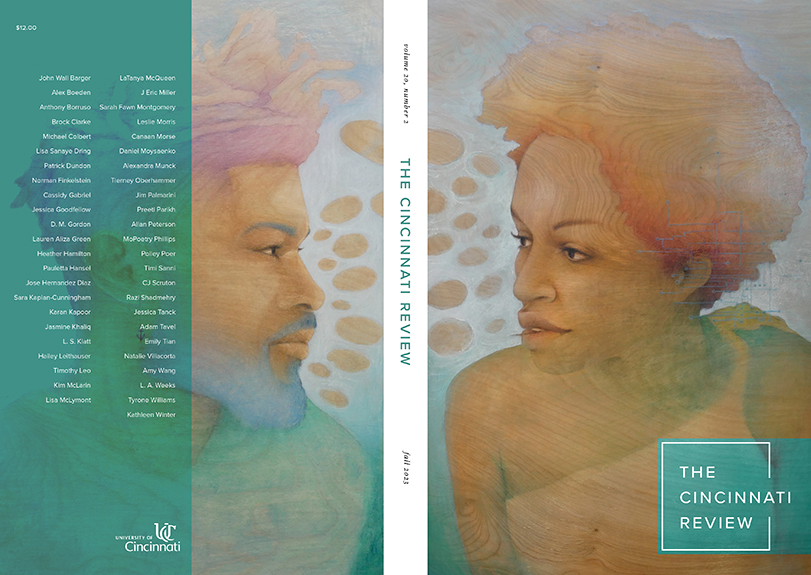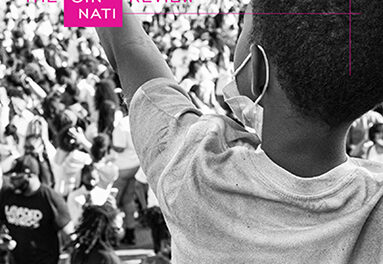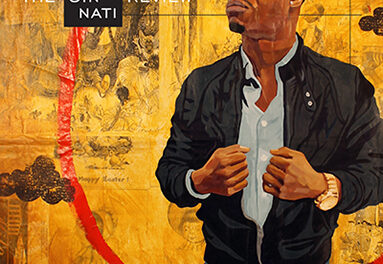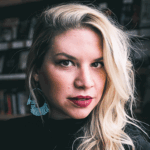In Issue 20.2, one of our twentieth-anniversary issues, we present a special feature on where writing lives in Cincinnati. We reached out to six writers who are current or former residents of the city,giving them the following prompt:
We’ve been thinking about Cincinnati as the site of intersections: of North and South, with the subversive crossing between them by the Underground Railroad; of the geography shaped by an advancing and then retreating glacier, the Ohio River, and the hills; of the Indigenous Algonquian speaking tribes, including the Delaware, Miami, and Shawnee tribes, whose land was taken by white settlers as it became known as Losantiville in 1888. We’re interested, also, in thinking about how the diverse strands of our literary community intersect (or not) here in Cincinnati. Though our various groups focused on creative writing have sometimes felt like separate silos, the Cincinnati Poet Laureate position, the Cincinnati and Hamilton County Public Library writer-in-residence program, and other initiatives like it are breaking down those divisions at times. What is the story of Cincinnati and its literature(s), from your point of view? Where does writing “live” here?
We’re pleased to share here Jim Palmarini’s poem as contribution to the conversation. (Read the entire feature here.)
WELCOME TO THE READING
AT
Cage Gallery on Fourth in ’87, where a curved picture window waved and beckoned poets, artists, and the curious—me among them—to the black trench coat that was Aralee Strange, approaching with “What’s all this poetry business and what are we going to do about it.” And thus, it began.
WELCOME TO THE READING
AT
Some looming brick four-story abandoned just down Fourth, the OH river wind blowing maybe the winter dead, maybe the living, one and all singing up Broadway and down to us sitting with two junkie poets in their cathedral where we fled to when the power failed at Cage one night—“It’s cold but cool” they said, “but whaddya want, it’s February—add some kerosene to the honeycomb and let’s read. By the way, can you hold this spoon while I fix?”
WELCOME TO THE READING
AT
Newport’s Southgate House 1—the second-floor once-upon-a-bar from the ’50s that Aralee and I scrubbed out and prayed to on our hands and knees, then on grand-opening reading night had to search the strip clubs of Monmouth cause Roger—the ne’er-do-well who bedded in the space—had the only door key and wasn’t a poetry fan, though he did once claim to me that speaking in tongues was granted by god and thus the only true poetry.
WELCOME TO THE READING
AT
OTR’s Kaldi’s—holy holy Kaldi’s with its goat and books that nobody bought but everybody read while Main Street seers spun unimpeachable lies or myths—depending on the drink that depended on the hour that depended on the tottering stool of mortality that day—all led by Saint Ken Kawaji hanging in a green pew with the Buddha at his side, mortal soul in his pocket sobering up the lot of them daily so declarations and poems could begin anew. All this blessed churn before Vine and Main got swallowed up by restaurants with names I can’t pronounce and don’t want to. Holy holy Kaldi’s, a space that seemed unimaginable without poets and so it gloriously was until it wasn’t anymore and the poets and the goat and books and the prophets vanished—we look for them still, seek answers from the shadows lurking in Gabriel’s Corner.
WELCOME TO THE READING
AT
The Southgate 2—one night when the moon and stars and a couple of rats let the rain have its way with the room’s ancient roof beams, our space flooded and drove us to the main concert room—a cavernous echoey haunt of ’40s big-band ghosts who no doubt wondered what the hell we were doing there. The balcony beckoned and we spread out in the arch, shouted poems across the void, filled up those spirits you bet, and left the door open in case the phantoms wanted to make a run for it or maybe for Roger if he perhaps wanted to turn loose his chorus of tongues to save us all.
WELCOME TO THE READING
AT
Sitwell’s 1 and Sitwell’s 2 in Clifton—
One, a basement beatnik spot with a back room guarded by a beaded curtain—“Keeps the fools out and the saints in,” said proprietor Lisa, who seemed to accept me as something in between.
Two, uptown on Ludlow, if there is such a thing. “You can’t read in the center of the room—that’s where the regulars are,” said the management. “You might disturb them.” Well, yes, said I—poets do disturb. The door was shown.
WELCOME TO THE READING
AT
Newport’s York Street Café upstairs—a place that summoned up my catholic youth, choir book in hand, narthex never far away for it was the most churchlike venue ever given its grand arch window-frame-ing every poet and penitent who heard the space’s call but as the owners were not saints, when a bar mirror and a poet had a disagreement, peace in the kingdom was cast asunder. The door was, again, shown.
WELCOME TO THE READING
AT
The InkTank storefront on Main, the only reading series I ever knew borne of a concept, until the entrepreneur Kathy H lost her laptop to a couple of junkies while we were outside between sets contemplating whether the sirens of the Parkway were a sign of the apocalypse—instead maybe it was just those two same junkie poets who froze me out on Fourth years before.
WELCOME TO THE READING
AT
A storefront coffee shop in Norwood on Montgomery whose sole sign was a neon notice—coffee, coffee, coffee. And that is all they had. A teen slam it was, won by my eldest daughter, Lucia, and the esteemed Bill Polak’s daughter, Kate. Closed two months later—dental office last I looked.
WELCOME TO THE READING
AT
The Southgate 3 in the first-floor pool room on a night we simply could not find Roger. I begged the owner Ross Raleigh for a key of our own. “No parties or wedding receptions allowed,” said Ross. Aralee and I complied and stuck with poetry, once a month, though I’m not so sure our readings weren’t their own kind of celebration—just a union of poets in sickness or health, speaking in tongues.
WELCOME TO THE READING
AT
The joint with the steel pig down the way from MOTR on Main—cop bar now, I think, or maybe not. One night a poet kicked it good, maybe the guy who had the mirror encounter at York Street. He came up howling, limped back in and riffed a poem about how much he hated pigs and loved dogs. Never saw him again though. Poets and pork. Poets and dogs—what it is, I think, is the soulful eyes of each and we’re jealous or grateful for what they know.
WELCOME TO THE READING
AT
A sushi bar on Ninth downtown—weirdly memorable for its mix of RaElf and other poets cranking words while raw fish was being whack whack whacked a few feet away. I had no compassion for the eyes of fish until I heard the great Bob Kaufman croon of a fish with no eyes at SF’s North Beach Tivoli. Bob, you were right—there is no true blindness under god’s eye.
WELCOME TO THE READING
AT
Northside’s Comet—a roadside north-star bar with a honky-tonk feel, where burritos ruled and a whiff of Texas seemed afoot. Memorable as the first place I ever heard Mark Flanigan tell one of his wry tales of woe and redemption. Mark—why is it that the women in our lives are always smarter than we are?
WELCOME TO THE READING
AT
Highland Coffee House in Clifton, where the owner asked if we could quiet down—we moved to the outside courtyard and got louder.
WELCOME TO THE READING
AT
Stenger’s OTR restaurant in a back room that drew a lunch crowd who were astounded and moved that one could write a poem about roast beef—the house specialty. No pigs and dogs were discussed, horses neither.
WELCOME TO THE READING
AT
Downtown’s Milner Hotel, wrecking ball spent years ago, then a spontaneous but not unappreciated bar ambush of a place on the route of the now-forgotten ’80s three-day poetry fest Khumba the River, spoken of only by those who were there, and you know who you are.
WELCOME TO THE READING
AT
Place called 1313 Vine—reborn today as a shiny OTR edifice. Used to be a dangerous fun house of wires, rebar, and unmoored concrete all held together by squatting artists and probably those two junkies. It was the Khumba’s ghost light for a few days. Maybe those voices are still humming under the eaves, holding the whole place up and living it up with the Kaldi’s crew and Roger, Aralee, and Kawaji looking out for the whole incorrigible lot.
WELCOME TO THE READING
AT
The Southgate 4: fifteen years down the road, Aralee and I on an afternoon run stoned revisit the main bar where owner Ross Raleigh, stool-bound and lit, upon witnessing our arrival, said—“’bout time you guys showed up: When’s the reading start?” Blessed be you, Ross, said I, and Aralee offered a hand as the tongues began their chant to the bell tower, to Fourth Street, to Kaldis, to this and that lost place of coffee and books and words spoken into the ether—we are here we are here and are not leaving, they say I say you say.
WELCOME TO THE READING
AT
MOTR MOTR MOTR—beloved Word of Mouth church of the ongoing spoken yawp and blessed as the venue that has never thrown me or any other poet out, who stepped up and mouthed off and listened to their brethren. Who will be first? Is it you? Is it me?
It starts now and will be evermore because for it not to would summon an unbearable silence that I cannot imagine. We are poet apostles who make the air and ourselves accountable with our voices, calling out the world and asking others to bear witness to what makes us human. Now . . .
Welcome to the reading. Welcome to the reading. Welcome to the reading.
Jim Palmarini has been facilitating and participating in public poetry readings in Cincinnati for over thirty-five years. He currently hosts the long-running Word of Mouth Cincinnati series at Over the Rhine’s MOTR Pub.











